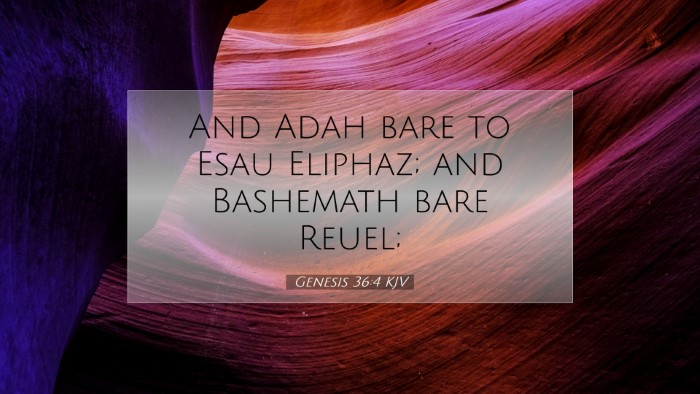Commentary on Genesis 36:4
Genesis 36:4: "And Adah bare to Esau Eliphaz; and Bashemath bare Reuel."
Introduction
Genesis 36 provides a genealogical account of Esau, who is also known as Edom. This passage is significant as it offers insights into the descendants of Esau, contrasting them with the lineage of Jacob, which sets the stage for understanding the unfolding events in the biblical narrative. The mention of Esau's wives, Adah and Bashemath, and their children, Eliphaz and Reuel, invites deeper exploration into the themes of heritage, identity, and divine purpose.
Genealogical Importance
While genealogies may sometimes appear tedious or unimportant, they provide a vital framework for understanding the unfolding biblical story. Public domain commentaries unanimously stress that the record of Esau's line is critical for grasping the development of nations and peoples in Scripture.
- Matthew Henry: Emphasizes that God’s providence governs all families, and even the genealogy of Edom serves a purpose in pointing towards the larger narrative of redemption.
- Albert Barnes: Notes that the descendants of Esau play an important role in the history of Israel, showing the intricate connections between the two lineages.
- Adam Clarke: Reminds us that the genealogies serve to illustrate the fulfillment of God’s promises, as both Jacob and Esau become ancestors of nations.
Esau's Wives
Verse 4 mentions Esau's wives specifically, indicating the importance of marital choices in shaping heritage.
- Matthew Henry: Highlights that the choice of wives reflects Esau’s character—his marriages align with the theme of earthly pursuits over spiritual priorities.
- Albert Barnes: Points out that Adah and Bashemath represent different aspects of Esau's life, blending both affection and practicality in his family life.
- Adam Clarke: Suggests that the names of Esau's wives carry meanings that indicate their roles and the nature of the household established by Esau.
Eliphaz and Reuel
The sons born to Esau are of considerable interest, particularly Eliphaz and Reuel. Their names and roles can provide insights into their character and the legacy of their father.
- Matthew Henry: Notes that Eliphaz, whose name means "God is fine gold," might suggest a spiritually inclined role within the family line, indicating potential godliness contrasted with Esau’s profane nature.
- Albert Barnes: Elaborates on Reuel, whose name means "friend of God," discussing his possible significance in the unfolding of God's covenant through the families descending from Esau.
- Adam Clarke: Discusses the implications of their names as reflective of the values embraced or rejected by their father Esau, urging pastors and theologians to reflect on the impact of heritage on spiritual identity.
Contrasting Lineages
This genealogical passage encourages readers to understand the contrast between Esau's lineage (Edom) and Jacob's lineage (Israel). This contrast has profound theological implications.
- Matthew Henry: Observes that the descendants of Esau became nations set against Israel, suggesting a continual struggle that symbolizes the conflict between the flesh and the spirit.
- Albert Barnes: Reflects on how the Edomites often served as a foil to the Israelites, emphasizing theological themes of chosen vs. non-chosen, blessing vs. curse.
- Adam Clarke: Remarks that understanding these relations enhances the overall narrative tension regarding God’s covenant and His dealings with different nations.
God's Sovereignty
In the broader context, Genesis 36:4 invokes a broader discussion of God's sovereignty over nations and individuals. The mention of Esau's descendants is an affirmation of God's control over history.
- Matthew Henry: Affirms that despite Esau’s rebellion, God had a purpose for his lineage, which played a role in the divine plan for Israel.
- Albert Barnes: Emphasizes that God's providence is evident in how both families developed, outlining His overarching plan despite human choices.
- Adam Clarke: Suggests that the genealogies serve as a reminder that God's purposes are achieved through diverse means, including those considered outside of the covenant.
Lessons for Today
Pastors, students, and theologians can draw contemporary lessons from this passage, emphasizing themes of heritage, identity, and the consequences of choices.
- Moral Choices: The marriages of Esau reveal the importance of aligning life choices with spiritual convictions.
- Legacy: The names of Esau's descendants remind modern readers that names and identities carry significance for future generations.
- Divine Providence: This passage encourages believers to trust in God’s sovereignty over their personal and communal histories.
Conclusion
Genesis 36:4 serves as a critical point in understanding the development of Esau's lineage and the broader narrative of Scripture. From the genealogical implications to the themes of divine sovereignty and personal choice, this passage offers profound reflections relevant for modern faith leaders and scholars. As we study these lines, we are reminded of the intricate ways God weaves together the stories of His creation and the unfolding of His redemptive plan.


